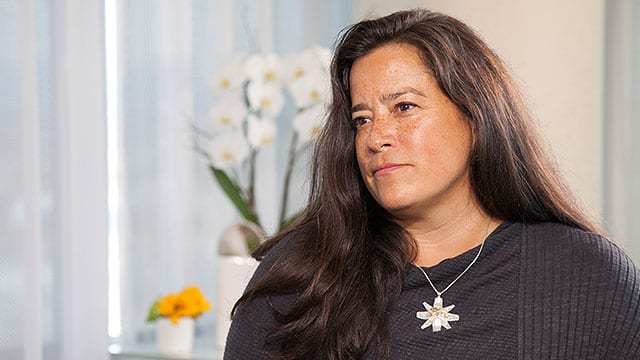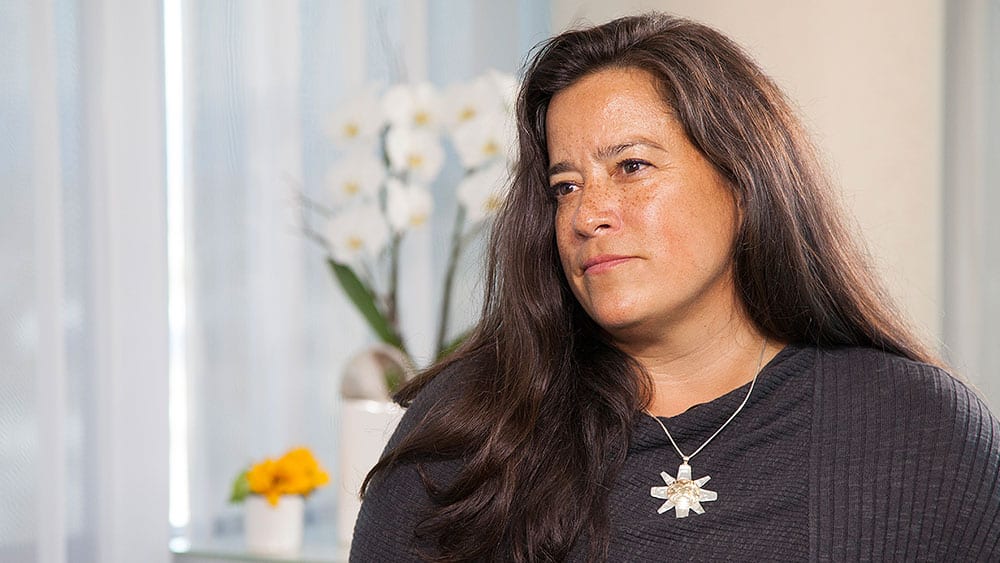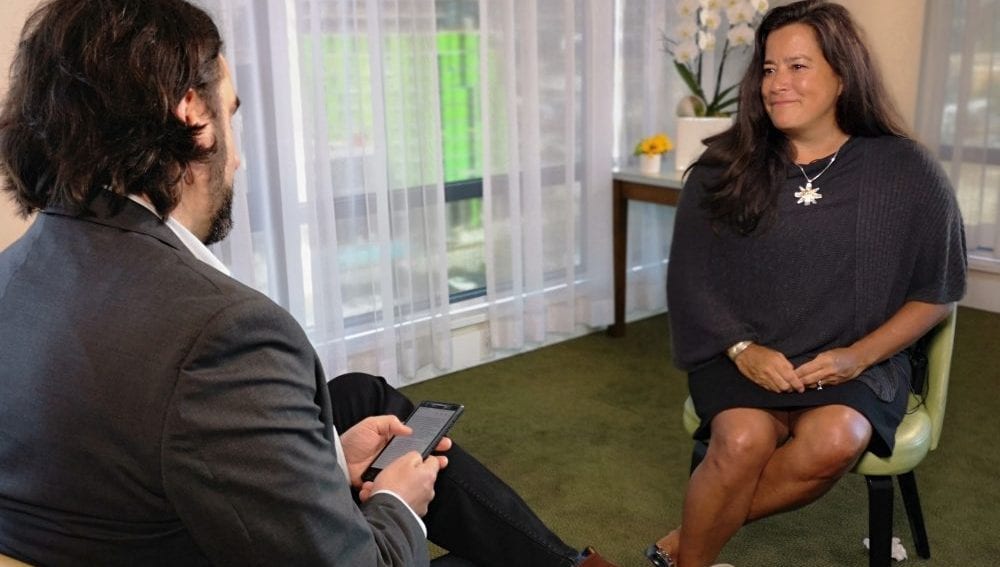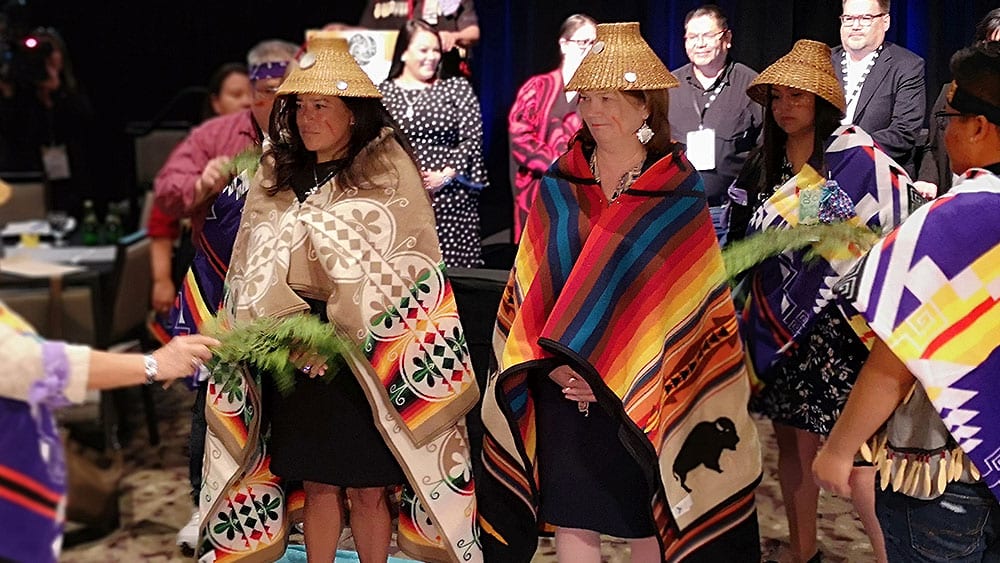

Before her ousting from the Liberal caucus, and before her removal as Minister of Justice and Attorney General in January’s cabinet shuffle, Jody Wilson-Raybould endured another setback in her effort to strengthen Indigenous rights in Canada.
The Vancouver—Granville MP said she is “disappointed” that she was removed last summer as the lead minister of a cabinet committee tasked with reviewing federal laws and policies that impact Indigenous Peoples.
In August that group, which would play a role in shaping the government’s proposed Recognition and Implementation of Indigenous Rights Framework, its interpretation of the United Nations Declaration on the Rights of Indigenous Peoples, and its eventual legislative reform on child welfare and Indigenous languages, was replaced with the Cabinet Committee on Reconciliation, chaired by Minister of International Trade Diversification Jim Carr.
“You’ll probably have to ask somebody else that question, perhaps the prime minister,” she said, asked why she lost her leadership role on the review.
Wilson-Raybould said she brought to the committee an “expertise that I was able to accumulate over the course of my life,” including “knowledge and understanding of what it means to be Indigenous, what it means to live in an Indigenous community.”
Asked about the committee changes in March, and again this week, the Prime Minister’s Office would not comment on the situation and directed questions from APTN News to the Privy Council Office (PCO), where a spokesperson would not explain why Wilson-Raybould was removed.
The move appears to have marked the beginning of a controversy that unfolded in the shadows of the SNC-Lavalin scandal.
Wilson-Raybould is coy about the details, but spoke broadly to APTN about the challenges she faced on key files during her time as Minister of Justice and Attorney General.
Trudeau’s “historic speech” and the short-lived Rights Framework
On Feb. 14, 2018, Prime Minister Justin Trudeau delivered what Wilson-Raybould called an “incredibly historic speech” in the House of Commons.
“[T]he challenge, then and now, is that while Section 35 [of the constitution] recognizes and affirms Aboriginal and treaty rights, those rights have not been implemented by our governments,” Trudeau said, announcing his government would develop, “in full partnership” with First Nations, Inuit, and Métis, a Recognition and Implementation of Indigenous Rights Framework.
But that work has not come to fruition, and along the way relations between Wilson-Raybould and some of her colleagues broke down.
“The challenge for me… was ensuring that we create the space for transformation in the legal framework of the country,” Wilson-Raybould recalled, adding the work would be “incredibly difficult,” and that it would require “clarity of thought… and understanding of where we’re seeking to go.”
In a speech before the Business Council of B.C. last April, Wilson-Raybould described the federal government’s continued denial of Indigenous rights as being at “the heart of why we do not have certainty” in resource development industries.
Certainty, she said, “is about clarity with respect to jurisdiction, law-making, and authority.”
Certainty “is something I think everyone desires – industry, Indigenous peoples and governments.”
But within a matter of weeks Assembly of First Nations leaders — many of them Wilson-Raybould’s former colleagues from her time as B.C. regional chief — began to push back against the proposed rights framework.
In particular, chiefs didn’t like the 10 Principles Respecting the Government of Canada’s Relationship with Indigenous Peoples — developed in part by the working group of ministers led by Wilson-Raybould — which were to guide the government on various policy and legislative reviews.
In his opening remarks at a special chiefs’ assembly in Gatineau, Que. last May, AFN National Chief Perry Bellegarde said the 10 principles “don’t exactly align with the standards of the U.N. Declaration on the Rights of Indigenous Peoples (UNDRIP).
“We didn’t develop them. And the process that they are using is not our process – it’s their process, their timeframe,” Bellegarde added, speaking on government’s work toward the framework. “They are trying to rush it. And we’re saying slow it down, slow it down so we all understand what is involved.”
Wilson-Raybould said she wasn’t necessarily surprised by the AFN’s response, and that many, including Indigenous Peoples, “are concerned when we move away from the status quo.”
She said the 10 principles originated at the AFN, during her time with the organization.
“The principles speak about having an economic component to rights, they speak about the necessity of having the Honour of the Crown engaged in all interactions that the federal government participates in,” she explained, adding the principles are rooted in the Royal Commission on Aboriginal Peoples, and in the UNDRIP.
In July, the AFN passed a resolution calling on Canada to “set aside” the 10 principles and “halt the [framework] process going forward,” to make way for a First Nations-led process.
In August, Indigenous legal experts Mary Ellen Turpel-Lafond, Grand Chief Ed John and Grand Chief Wilton Littlechild wrote Trudeau expressing concern over disparities they saw between the government’s promises related to the framework, and the direction things were heading.
They also urged the prime minister that Wilson-Raybould “must be engaged to provide the legal advice and direction for the Crown” on the Framework.
By the time First Nations leaders met in early September to discuss the framework, the plan was already dead, and Wilson-Raybould was off the file.
In his Feb. 21 testimony before the House of Commons’ Justice Committee, former Privy Council Clerk Michael Wernick revealed that Trudeau and Wilson-Raybould met on Sept. 17 to discuss “very serious policy differences” between Wilson-Raybould and Crown-Indigenous Relations Minister Carolyn Bennett over the framework.
He described “something of a policy standoff among [the] ministers,” adding they had “different views on a very significant thing.”
Wernick also noted that he took over the framework file as government had its hands tied with NAFTA negotiations. The matter was referred to Carr and the Cabinet Committee on Reconciliation, and then to cabinet.
“There was a decision not to proceed with the rights and recognition framework,” he said.
Littlechild told APTN in February, a month after Wilson-Raybould was shuffled out of her role as minister of justice and attorney general, that he “can’t help but think” she was sidelined “because of the challenges that she had internally and her willingness to stand up against those challenges.”
Wilson-Raybould wouldn’t disclose details of her and Bennett’s reported policy standoff, but Bennett told APTN in February that “the goal of self-determination was completely shared” between the two.
Bennett indicated that while First Nations wanted to halt the process, those working on the matter for government wanted to move forward.
“I think we were all impatient,” she said.
Wilson-Raybould’s mounting frustration at the time found an outlet in her public speeches.
“The path of justice and equality is not advanced or achieved through half-measures, good intentions, or lofty rhetoric,” she said during a Sept. 27 speech in Comox, B.C. “And it is certainly not achieved through obfuscation or confusion about what we mean when we speak. Hard choices, innovative actions, transformations in laws and policies, new understandings and attitudes, new patterns of behaviour—this is what is needed.”
In Ottawa, on Oct. 30, she remarked that, as the first Indigenous person to be Canada’s minister of justice and attorney-general, “I have unfortunately had it reinforced that when addressing Indigenous issues, no matter what table one sits around, or in what position, or with what title and appearance of influence and power, the experience of marginalization can still carry with you. But this does not deter me. It only makes my resolve stronger and more determined.”
The civil litigation directive
By November, Wilson-Raybould was putting her energy into a directive on civil litigation for Indigenous Peoples the Department of Justice had been working on since July 2017.
On Nov. 28 she texted Trudeau’s principal secretary, Gerald Butts, saying she wanted to announce the directive the following day during a speaking engagement before First Nations leaders in B.C.
But the PMO told her to hold off, according to text messages between Butts and Wilson-Raybould that Butts offered before his justice committee testimony last month.
Instead of bringing B.C. chiefs good news, Wilson-Raybould ended her speech by quoting late Chief Joe Mathias, who said the turtle moves when he sticks out his neck.
“I say, let us stick our necks out. I am,” she concluded.
“If you want to move beyond the status quo…we have to stick our necks out. We have to take chances,” Wilson-Raybould told APTN, reflecting on that speech and period of time, when she was also facing what she has described as sustained pressure from the PMO and others over the SNC Lavalin controversy.
“The status quo is not working, and I feel that we have an obligation, not only as ministers at the time but as Canadians, to ensure that we do everything we can to create the space, the necessary space, for Indigenous Peoples to be self-determining as expressed in the United Nations Declaration on the Rights of Indigenous Peoples and to ensure that Indigenous Peoples can finally see themselves in the mirror of the constitution.”

She said the “frustration that existed” at the time was related to the “lack of progress” on the recognition and implementation of Indigenous rights.
“And I certainly would never seek to apologize being anxious about change and creating the space for Indigenous Peoples to rebuild their Nations,” she said.
Wilson-Raybould issued the civil litigation directive on Jan. 11, three days before she was shuffled out as minister of justice and attorney general.
The directive compels government to be less adversarial toward Indigenous peoples and groups in the courts, and according to the Department of Justice website, “promotes an approach to conflict resolution that will be consistent with the goal of achieving reconciliation with Indigenous peoples.”
Though it had already largely been operationalized in practice, Wilson-Raybould said she made it public as her final significant act as Justice minister, “because I felt and continue to feel very strongly that it sets and charts a different course in terms of our relationship, the Government of Canada’s relationship, with Indigenous people.
“I wanted to make sure that legacy, the work that the Department of Justice did when I was the minister, continues to carry on.”
Asked if the PMO knew ahead of time and approved of her decision to publish the directive on Jan. 11, Wilson-Raybould said there “were a number of minsters that have responsibilities around issues with respect to Indigenous Peoples that had been involved, and that included officials in the Prime Minister’s Office.”
When APTN reached out to the PMO to ask the same thing, a spokesperson directed the query to the Department of Justice, where a spokesperson there did not say if the PMO knew, but explained in an email that the directive “was posted in January as a transparency measure.”
From legislative to policy reform
The Trudeau government is facing new criticism for, as some have said, proceeding with the rights framework in another way — through policy changes instead of legislative ones.
Officials with Crown-Indigenous Relations have been meeting with the AFN and other First Nation leaders to discuss changes to four key policies impacting Indigenous Peoples.
Leaked documents from Crown-Indigenous Relations indicated the government hoped to have new Comprehensive Land Claims and Inherent Right Policies in place by June 2019.
The AFN has indicated it won’t accept tight timeframes and that First Nations want to lead a process to review the policies that ultimately determine how Canada and First Nations negotiate land and title rights and Indigenous self-government.
“I hope that the crown, the federal government in this case, in reviewing the so-called comprehensive claims policy, specific claims, the inherent right policy, will listen to Indigenous peoples,” Wilson-Raybould said.
But, she said frankly, “in absence of legislation or change in the law that moves from denial of rights to the recognition of rights, it is difficult for me to see how those policies are going to be long-lasting.
“The idea of a rights recognition and implementation framework that was rooted legislatively was to ensure that the space is created for the recognition of rights, and that recognition of rights would live beyond one government. That was the intent — that is how the relationship between Indigenous peoples and the federal government will be transformed,” Wilson-Raybould continued.
“So, I hope that the review of those policies will go well. It will go well if Indigenous communities that have experienced those policies in positive and negative ways are listened to, their experiences listened to, the decades of advocacy that they have been putting forward around changing those policies needs to be heard.”
“It’s not something that can happen overnight,” she said, adding she’s “a bit concerned about the time that’s left between now and the election.”

Jody Wilson-Raybould and former Treasury Board President Jane Philpott were honoured in ceremony at a First Nations Provincial Justice Forum in Richmond, B.C. Wednesday. Justin Brake/APTN.
On Wednesday Wilson-Raybould told delegates gathered at a First Nations Provincial Justice Forum in Richmond, B.C. that in early 2018 she thought “the basic Crown recognition of Indigenous title, rights and governments…was going to happen imminently,” following Trudeau’s Feb. 14 speech in the House of Commons.
“As you all know, this has not occurred — and I fear we may have temporarily fallen back into a less audacious, less meaningful conversation and mode of work that, while perhaps more comfortable, will not achieve the transformative space that is required.”
At the heart of the matter, she told APTN, is that “rights recognition—or how the government is continuing to move forward—is not dependent upon an agreement with the Crown.
“There are rights that Indigenous peoples have that are inherent. You can’t actually give somebody their inherent rights — they just exist.”










Thank you, Justin, APTN and Jody Wilson-Raybould.
Yukon T. First Nation Elder Elijah Smith lost his life over This Very Same Concept That Jody Wilson-Raybould is Discussing ; ‘ Land Claim Title Rights ‘ in The Yukon Territory of Canada. Under The Conservative Gov.’t Rule of Brian Mulroney… So it’s Not Just The Liberals. The “ Alaska Hwy Pipeline R/W “ is What Killed Elijah.